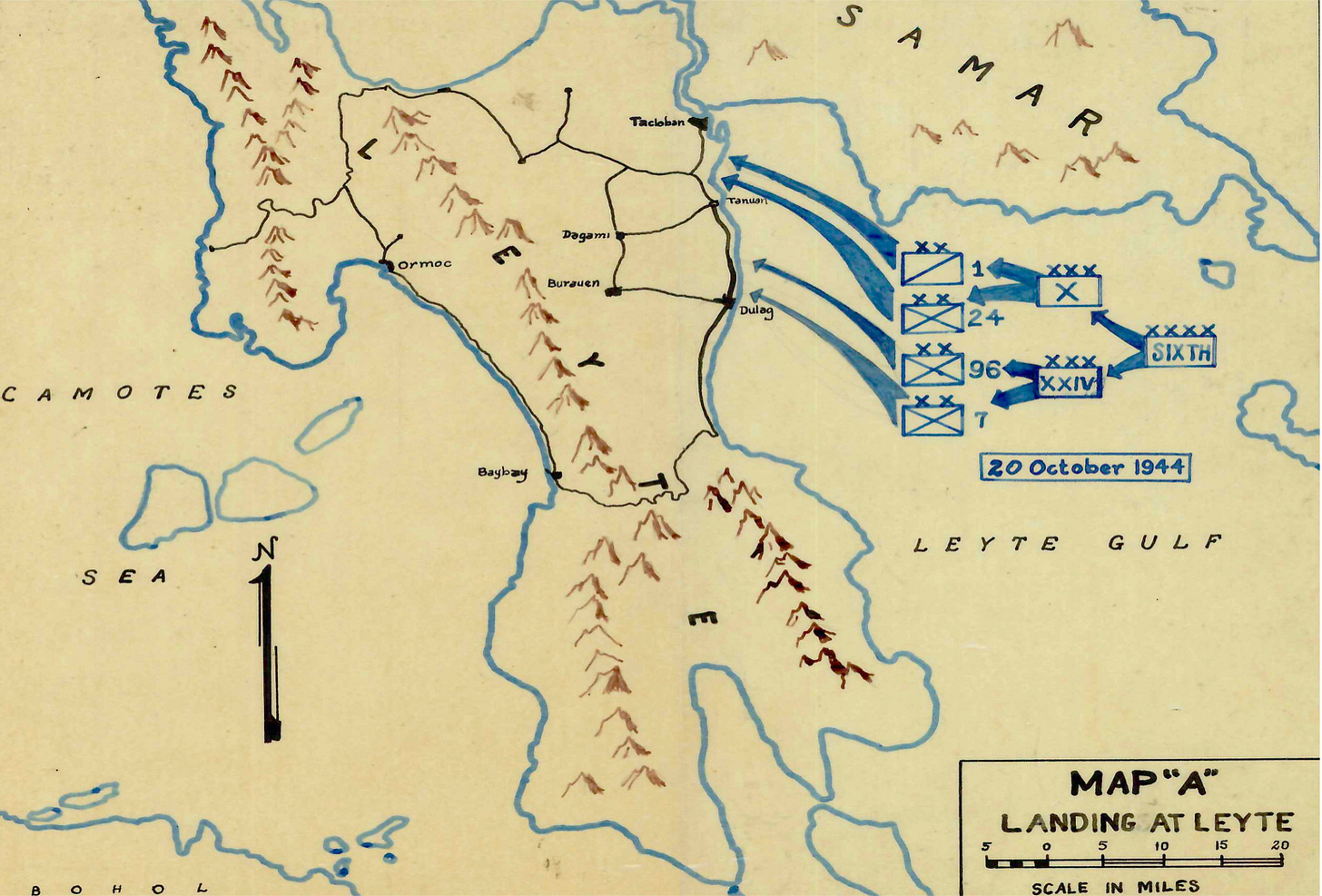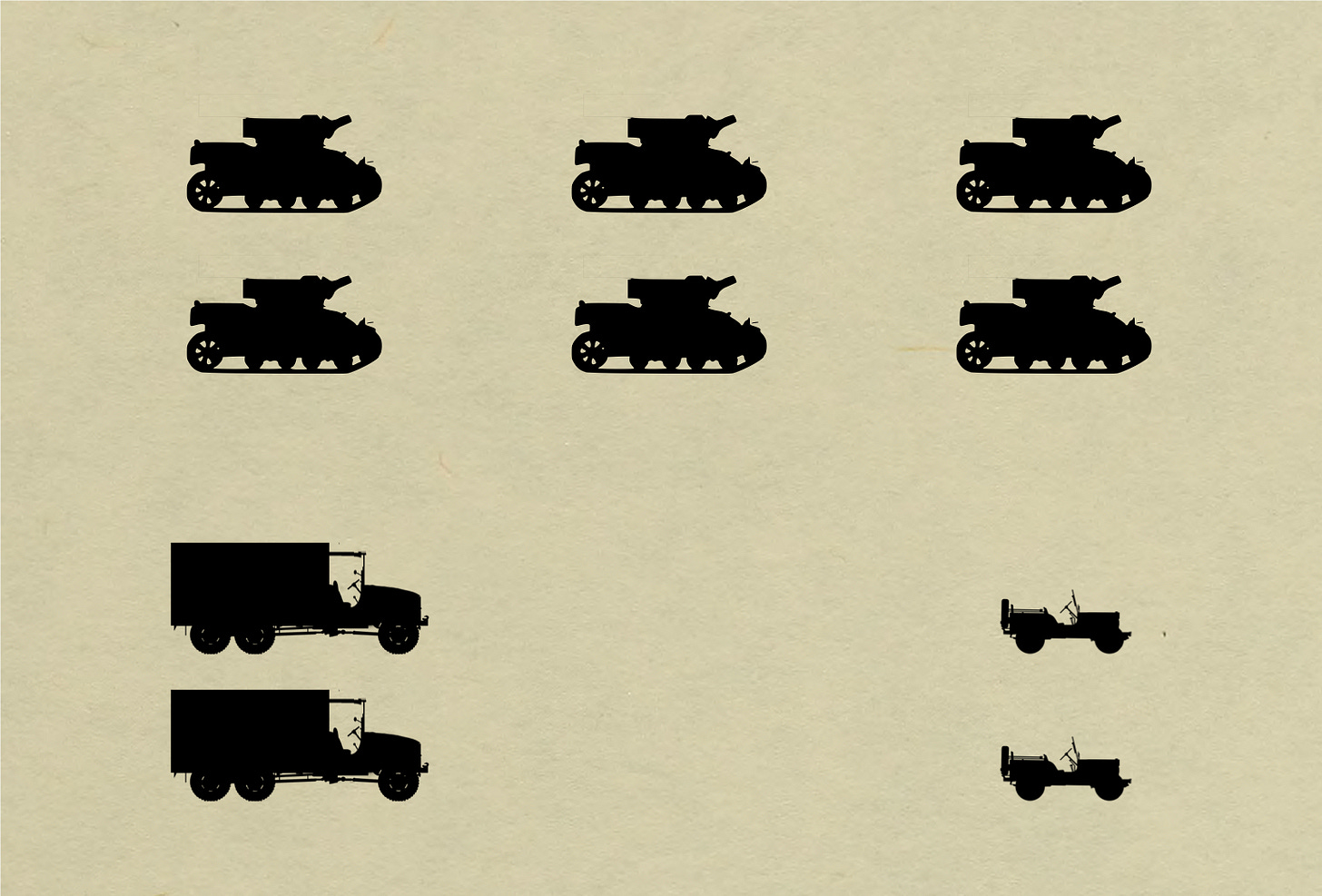Your name is Denmark C. Jensen. You command the cannon company of the 17th Regimental Combat Team (RCT), a task force built around your parent regiment, the 17th Infantry. (The 17th Infantry belongs to the 7th Infantry Division, one of the four such formations serving with the US Sixth Army.
On 20 October 1944, substantial portions of the Sixth Army landed on the island of Leyte, thereby beginning the long-awaited liberation of the Philippines.
Your company took part in that landing. Soon after coming ashore near the town of Dulag, the 3rd Platoon of your company began to move inland. (It has been attached to task force, built around a infantry battalion of your regiment, sent forward to secure a bridge.) The remainder of your company - two numbered platoons and its supporting elements - occupied an assembly area, where it awaited the arrival of the remainder of the 17th RCT, which was then serving as the reserve of the XXIV Corps.
Each of your platoons operates a pair of ‘howitzer motor carriages, M8 Stuart light tanks that, rather than the customary 37mm anti-tank guns, sported 75mm howitzers. Your company also possesses two ammunition trucks and two jeeps.
Each of your three numbered platoons consists of two gun crews (each of five men) and a seven-man ‘command and liaison’ section. Your company headquarters breaks down into
a ‘command post liaison team’ (yourself and three other men),
a command and reconnaissance team (four men)
an ammunition section (nine men)
a maintenance section (four men)
a mess section (five men)
a supply section (two men)
a group of ‘basic’ soldiers (five men)
two spare tank crews (ten men)
Made up mostly of men who fought alongside each other during the battle for Kwajalein and trained together for the better part of two years, your company enjoys a high degree of cohesion. In addition, your company possesses two spare gun crews, each of five men. (The guns these men had operated were taken from your company shortly before you boarded the ship that took you to Leyte.)
It is now the evening of 22 October 1944. Along with the main body of the 17th RCT, your company (minus the detached platoon) has taken up positions around an airfield, two-and-a-half miles west of the beach. You expect that, come tomorrow, your company will take part in a general advance towards the west.
So far, your regiment has made no contact with the enemy. You assume, however, that the quiet you have enjoyed for the past two days will soon end.
While you prepare your company for this ‘advance to contact’, you receive a telephone call from the S-4 (logistics) officer of the RCT. He asks that, when you move forward, you leave behind your ammunition sergeant - who leads your ammunition section - and four men. These, he explains, will be needed to bring up boxes of 75mm rounds that have been (or soon will be) dumped at the beach.
Your company is the only unit in the RCT that uses ammunition of this sort.
What now, Captain?
Please feel free to use the comments section to propose a solution to this problem. When doing so, please employ a first-person perspective. That is, rather than writing ‘Captain Jensen should’, please begin your response with ‘I would …’
If you are new to decision-forcing cases, you will find much of interest in the following article.






1 Yes....the sergeant and 4 men.
2. Contact the 346th Harbor Craft Company nearby, as they and a stevedore unit will be unloading on the beach. Contact Cpt Norefleet (Officer Commanding) or 1st Smith or CWO Lee. Be nice. They will alert you to any shipments of 75mm howitzer ammunition being unloaded.
Oddly, my father is one of those 3, and trust me, they'll be more than willing to help you.
Copy that, I would be also telling those guys to get their hands on cigarettes, coffee, rations, small arms ammo and anything they think would help morale.